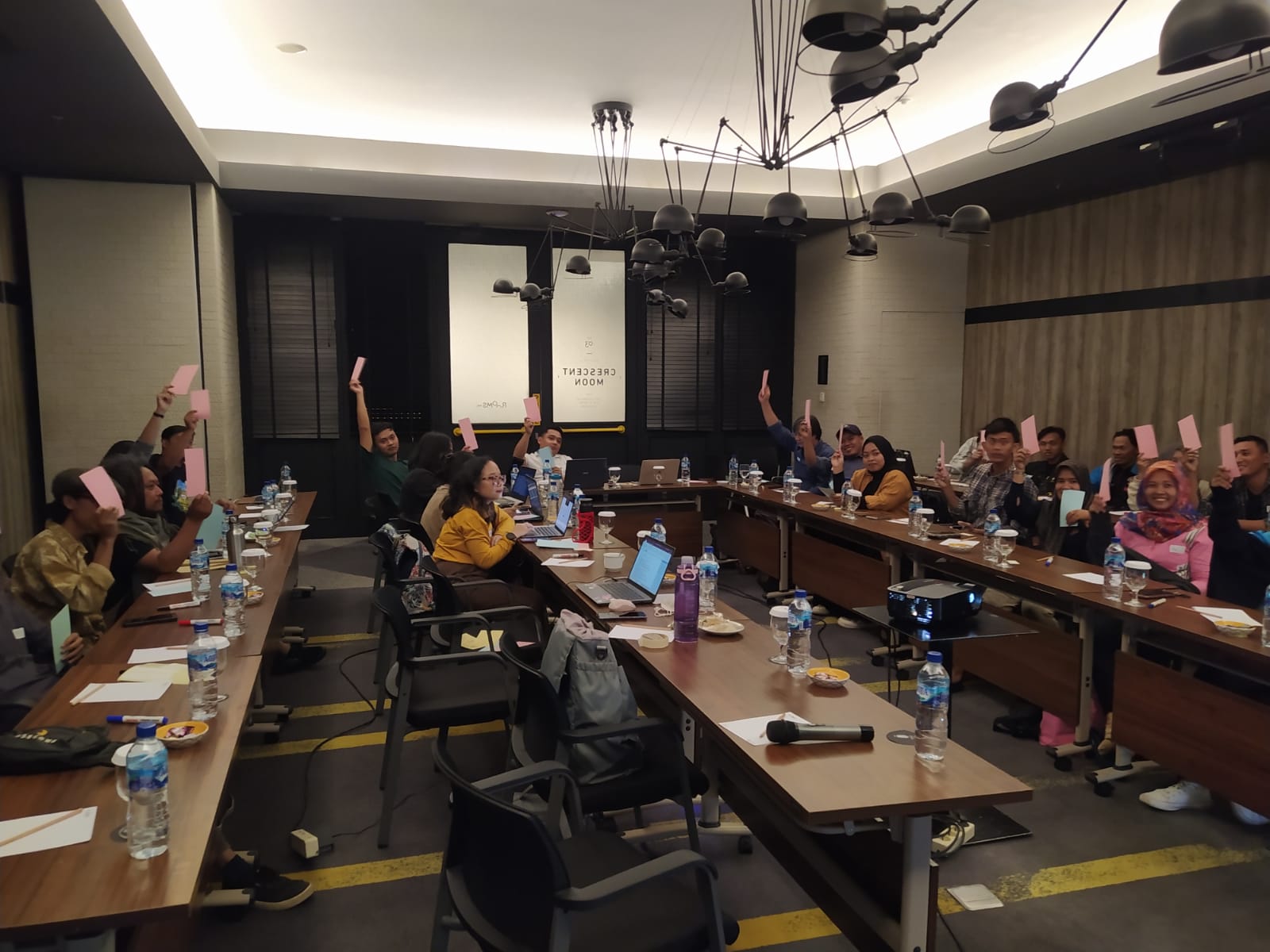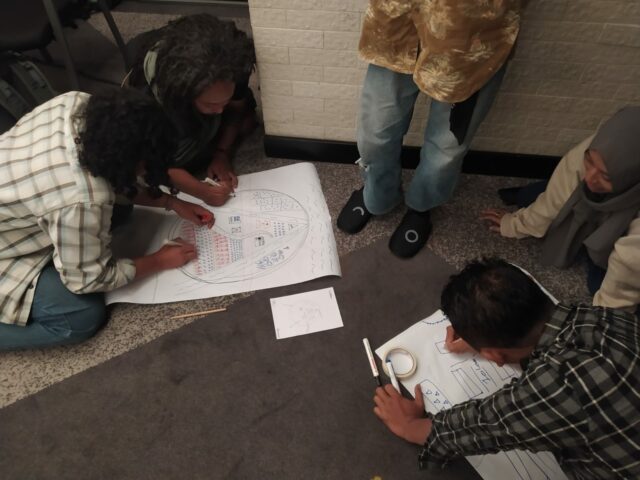
Climate Justice | August 31, 2023
Focus Is Getting Started: Exploring The Identity Of The Villages And Setting The Stage
Humanis Foundation

Fisherfolk Empowerment for Climate Resilience and Sustainability (FOCUS) project has a desired change to build integrated coastal management for a sustainable food system for the fisherfolk community, including women in Central Java.
Until December 2026, FOCUS will strive to achieve stronger participation of coastal populations in Batang, Kendal, Semarang, Demak, and Jepara in decision-making on coastal resource planning, provide advocacy to promote a more sustainable balance between the use and conservation of marine resources, and activities to improve local value-chains at the local level.
HIVOS, through Yayasan Humanis dan Inovasi Sosial (Yayasan Hivos) in Indonesia, leads the consortium, with Koalisi Rakyat untuk Keadilan Perikanan (KIARA), Pusat Kajian Sumberdaya Pesisir dan Lautan (PKSPL-IPB), and Wahana Lingkungan Hidup Indonesia (WALHI) as partners.
In July 2023, the FOCUS team was fully engaged in orchestrating the commencement of the baseline study and the creation of village profiles. This initiative aims to yield valuable outcomes, namely the generation of baseline data and the crafting of village profiles that foster sustainable and inclusive livelihood prospects for coastal communities, specifically focusing on marginalized groups such as women and youth. Our approach centers on employing participatory and inclusive data collection methodologies, ensuring a profound level of engagement from all members of the targeted villages.
“The baseline data and village profile must be formulated thoroughly and up to date. Data that illustrates the condition of the nine targeted villages must be comprehensive and participative, thoroughly encompassing the socio-gender, economic, and ecological factors. These three factors are inseparable from one another and affect each other whenever changes occur in one particular aspect. Although what is needed is the most recent data, the process will also look at how the past dynamics led to the current conditions. Environmental conditions will also be the target of identification in each village, namely what natural resources can be utilized to develop villages and manage coastal areas for sustainable food system and climate adaptation.” M Syafiq (Agrarian Resources Center – Team Leader of FOCUS Baseline Study and Development of Village Profiles)
This study does not merely examine the interrelationship of the three factors in a particular space and time but must consider the changes in between exploring the guiding questions in the political-economy approach: Who owns what (or who has access to what)? Who does what? Who gets what? What do they do with it? How do social classes and groups in society (and within the state) interact with each other? How do they How do changes in politics get shaped by dynamic ecologies and vice versa?
Both the baseline study and village profiles will assume pivotal roles in steering and bolstering FOCUS activities, while also effectively addressing the project’s indicators and advancing its immediate, intermediate, and ultimate objectives. Our intention is to incorporate precise details to ensure the project’s capacity to facilitate decision making grounded in evidence, amplify its influence, and secure sustainability beyond the project’s stipulated timeframe.
Why Gender Equality and Social Inclusion (GESI) Analysis in Developing Village Profiles?
The primary objective of baseline study and village profiles is to attain a comprehensive understanding of the initial conditions and unique attributes that warrant assessment before introducing targeted interventions. These interventions are strategically designed to realize the FOCUS’s overarching objective of cultivating sustainable and all-encompassing coastal livelihoods within the communities.
This process entails the identification and analysis of accessible resources and prevailing limitations. These constraints encompass both structural and relational dimensions, which impact the coastal communities across the nine villages. The active participation of the local community in data collection process assumes paramount significance, as it offers firsthand depiction of the challenges they navigate.
“An integrated GESI analysis remains at the core of the entire process. It entails continuously questioning and prioritizing assumptions about GESI interests, particularly related to changes in access to and control over resources, including specific power dynamics and experiences of inequalities faced by the communities. This analysis ensures that interventions effectively benefit all members of the target communities, addressing inequalities and promoting social inclusion. The project aims to identify and tackle dynamics related to GESI that may influence the system and hinder meaningful participation and opportunities for marginalized and excluded groups.” Fadilla D Putri (GESI Specialist FOCUS, Yayasan Humanis dan Inovasi Sosial)
It is imperative for FOCUS to produce the village profile documents of nine targeted villages in order to better understand each village’s distinct character comprehensively. This involves collecting essential data on households, potential natural resources, institutions, livelihood patterns, infrastructure, and trends in ecological, economic, and social aspects. The active engagement of the local community in developing the village profile is of utmost importance as it allows for a collective identification of the village’s problems and potential.
By involving various stakeholders and gathering their perspectives, it becomes possible to propose project interventions that aim to promote economic progress and ensure the ecological sustainability of the village, fostering a brighter and more resilient future for the fisherfolk communities in the region. Furthermore, the village profile serves as a tool for the local community to gain a deeper understanding of their reality and engage in collective reflection about their home and livelihood within the village.
Gender Equality and Social Inclusion (GESI) Capacity Building for the Field Team
Before commencing the data collection process for Baseline Study and Village Profiles Development, Yayasan Hivos provided capacity building for local enumerators and field officers on gender equality and social inclusion approaches in the processes of data collection, analysis, and writing the village profiles.
The training took place at Semarang, in early August 2023 involving 9 women participants and 12 men participants.
During the capacity building, participants were able to gain new knowledge and skills as well as discuss deeper among several aspects, including but not limited to:
- Gender differences/inequities that are caused by stereotypes/prejudices including analyze factors that shape gender injustice
- Develop collaborative drawing that map the activities of villagers, especially which are related to access and control
- Playing a game/role play that resulted reflections on the aspects of intersectionality (e.g., identity backgrounds, health status, education, culture, economy, geographical location, and so on)
- Exercising GESI and intersectionality perspective in looking at daily issues, for example, by looking at how an issue can impact women and men differently
- Analyze the various inequalities that occur due to unequal power relations (capital owners versus people, men versus women, adult policymakers versus youth communities, and so on)
- Understand on how to maintain research ethics when playing role as enumerators and analysts
- Brainstorm on recommendations that address several issues related to them by also looking at the gender dimension and the needs of each different group
This training is tailored to meet the needs of local enumerators and field officers who directly engage with coastal communities in 5 districts within Central Java. Therefore, the training incorporates exercises and case studies that center around the lives and challenges faced by them. The content considers the activity, access, and control dynamics with diverse groups, encompassing women and youth as well.
Some lessons learned from the training are: 1) Gender construction becomes problematic when different positions and roles attributed to women and men result in imbalanced relations and create discrimination against one party. 2) Each individual is born with different identities (based on gender, ethnicity, religion, geographic location, etc.) wherein these identities can determine their position in society, including their access and control over resources and decision-making. 3) Gender analysis and social inclusion can assist local enumerators and field officers in recognizing these aspects, simultaneously aiding them in sharpening data analysis by considering the unique experiences across different groups, especially those who are marginalized and whose voices are rarely heard.
Thus, let’s wish the best for FOCUS’ baseline study and development of village profiles that will last until October 2023. May this unfold seamlessly and yield outcomes that align with our highest expectations!
***
Photo in the header: FOCUS’ field team playing game during capacity building on GESI
Photo credits: Ruhaina Zulfiani/Nisrina Nadhifah

